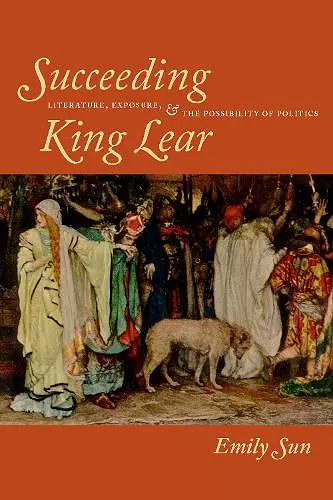Succeeding King Lear
Literature, Exposure, and the Possibility of Politics
Format:Paperback
Publisher:Fordham University Press
Published:1st Nov '12
Currently unavailable, and unfortunately no date known when it will be back
This paperback is available in another edition too:
- Hardback£54.00(9780823232802)

This book investigates Shakespeare's King Lear and its originative power in modern literature with specific attention to the early work of English Romantic poet William Wordsworth and to the American writer James Agee and photographer Walker Evans's 1941 collaboration, Let Us Now Praise Famous Men. It examines how these later readers return to the play to interrogate emphatically the question of the relations between literature and politics in modernity and to initiate in this way their own creative trajectories. King Lear opens up a literary genealogy or history of successors, at the heart and origin of which, the author claims, is a crisis of sovereignty. The tragedy famously begins with the title character's decision to give up his throne and divide the kingdom prior to his demise. In bringing to light the assumptions behind this logic, and in dramatizing its disastrous consequences, the play performs an implicit analysis and critique of sovereignty as the guiding principle of political life and gestures, beyond sovereignty, towards the possibility of a new aesthetic and political future.
The question of the relations between literature and politics does not only open up immanently or internally within King Lear, this book argues, but is also that which occasions a literary history of readers who return to the play as to an originary locus for dealing with a problem. Among such successors are Wordsworth in the 1790s after the French Revolution and Agee and Evans during the Depression in the 1930s, whose engagements with Lear, this book argues, were crucial to their development of new artistic means towards creating a democratic literature. In bringing British Romanticism and American modernism into contact with their literary political origins in Shakespeare, this book offers an original way of thinking literary history and a new approach to the question of the relations between literature and politics in modernity. In its interdisciplinary and cross-period scope, it will appeal to students and scholars of Shakespeare, Romanticism, modernism, literary theory, as well as literature and photography.
"Emily Sun subtly and lucidly explores the role of literature as that which 'exposes us to the possibility of an aesthetics and politics of plurality.' Framing her powerful readings with King Lear as a theater at the limit of sovereignty, Sun traces the return of this play in the literary history it opens up, a literature that exposes us to the "radical asymmetry of human perspectives" even as it offers new possibilities for altered forms of listening and telling. The literary texts she reads become, thus, not only sites that reveal a crisis of sovereignty, but also serve as events that demand from us, as she says, a responsiveness before responsibility, and that, in putting "'the world' into question in the face of the unknown," open up a new literary as well as political mode of co-existence." -- -Cathy Caruth Emory University "An excellent work of theoretical synthesis applied to thoughtful, continuously challenging readings of texts that at once form an intuitive unity and at the same time consistently resist and correct preconception through Sun's circumspect, nimble critical strategies." -- -Paul Fry Yale University With her canny intuition for unlikely cultural trajectories, Emily Sun adroitly unfolds a discussion of three aesthetic interventions in a critique of political tyranny. As she moves from Shakespeare's King Lear to Wordsworth's poetry and Agee/Evans collaborative documentation of the impoverished of the 30s Depression, she draws us into a reading adventure, refocusing our vision of familiar texts, making them new in relation to her redefinition of what responsible writing and reading might be. This is literary analysis at its most thought- provoking. -- -Elisabeth Bronfen University of Zurich "Emily Sun has written an ambitious study that is a delight to read on how literary works foster a truly active rather than passive spectatorship as well as a "plural speech" necessary to avoid tyrannous political theologies. Drawing in major contemporary theorists, her patient and clarifying style, with its ability to zoom from large questions to telling textual detail, compels us to think anew about this task. All of us, her moving book insists, literary consumers or creators, must "succeed" great works of art in the sense of accepting and bringing to completion their demanding legacy." -- -Geoffrey Hartman Yale University
ISBN: 9780823232819
Dimensions: unknown
Weight: unknown
176 pages